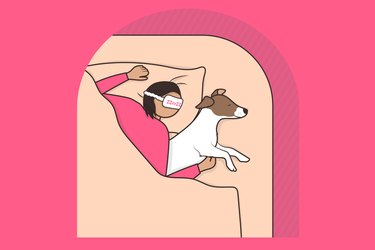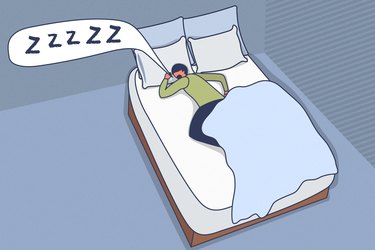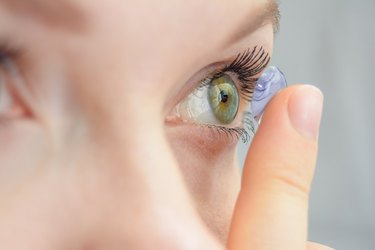
If you crave peak cozy, welcoming your cat or dog — or both — onto your bed delivers. After all, it's just so companionable to have a pet nearby thanks to the comfort of touching fur and the soft sounds of purrs and snuffles. But should you let your dog sleep with you?
And after a day spent together — cats twining through your legs while you make a morning cup of coffee, or your dog curled up nearby while you watch TV — cuddling in bed with your pet seems only natural. Indeed, a slim majority (56 percent) of pet owners invite cats and dogs into their bedroom, according to a December 2015 article in Mayo Clinic Proceedings.
Video of the Day
But there are some health implications to this practice. Here's what experts have to say about the pros and cons of bringing pets in the bedroom, and whether your dog (or other furry friend) should sleep with you.
1. Your Allergies and Asthma Might Get Worse
About a third of people in the U.S. are allergic to cats and dogs (with cat allergies more common), according to the Asthma and Allergy Foundation of America.
If you're one of that group, allowing your pet in the bedroom means about eight hours of exposure to allergens, says immunologist Heather Moday, MD, author of The Immunotype Breakthrough.
"Breathing in this level of allergens all night long can cause nasal congestion, sinus inflammation and airway irritation if you have asthma," Dr. Moday says. That makes it harder to get restful sleep, and means you'll wake up stuffy and tired in the morning, she says.
And it's not only pet allergies that you need to consider. Cats and dogs carry pollen and dust on their fur, Dr. Moday says. That means allowing pets in bed puts you in close contact with two more common allergens.
This can also exacerbate asthma, as allergies and asthma often go hand-in-hand. Common triggers (like dander, dust and pollen) that lead to allergic reactions like sniffles or itchy eyes can also set off asthma symptoms, according to the Mayo Clinic.
Tip
Regularly washing yourself and your pet is one allergy remedy that can help prevent excess dander, dust and pollen.
2. You Might Get Flea Bites
Some parasites like to live on cats and dogs (think: fleas, ticks and lice). And allowing your cat or dog in the bedroom is placing yourself in very close contact with these itch-causing creatures.
Fleas, for instance, bite humans, which can cause itching and irritation, per the Cleveland Clinic.
3. Your Sleep Could Suffer
When it comes to sleep hygiene, there aren't any benefits to having pets in bed, says sleep psychologist Samina Ahmed Jauregui, PsyD, a Pluto Pillow advisor.
But there are some drawbacks: Pets like to move at night, says Abhinav Singh, MD, facility director of the Indiana Sleep Center and member of the National Sleep Foundation medical advisory board. "That can wake people up," he says.
And it's hard to go back asleep after waking up, especially as we age, Dr. Singh says — which could reduce the quantity of sleep you get each night.
You'll know it if your pet wakes you up at 3 a.m. and you can't fall back to sleep right away. But what might be more insidious is when a pet's movement causes you to readjust more frequently than you would otherwise.
"Micro-awakenings are not recallable," Dr. Singh says. In other words, if you briefly wake up to toss and turn due to your cat or dog stirring, it's not long enough for your brain to register as a moment of wakefulness. But those brief bursts of sleeplessness still have an effect.
Dr. Singh compares it to flying: Would you rather fly nonstop or have seven connecting flights en route to your destination? These small, routine disruptions diminish the quality of your shut-eye. That'll leave you feeling unrested in the morning, even if you diligently clocked the Centers for Disease Control and Prevention-recommended seven-plus hours of sleep.
Jauregui sums it up: "Even if you are able to return to sleep quickly, having woken up in the first place is a disturbance in quality of sleep."
Want to improve the quality of your sleep? Try LIVESTRONG.com's 7-Day Kickstart Plan to Get Better Sleep.
4. It Could Improve Your Mood
It's not all doom and gloom. Bringing a pet into your bedroom is associated with some significant mental health benefits.
"Many people claim to really enjoy sleeping with their animals because they feel less lonely and happier with their pets," Dr. Moday says. And there are studies to back that up.
For instance, in a survey of just under 1,000 pet owners assigned female at birth, dogs were "associated with stronger feelings of comfort and security" compared to human bed partners, according to November 2018 research in Anthrozoös.
Also among the research-backed benefits of time with pets are an increase in oxytocin (a feel-good hormone) and a decrease in cortisol (a stress hormone), according to Johns Hopkins Medicine.
While Dr. Singh generally thinks bringing a pet to bed is best avoided, he makes an exception for someone who is overcoming loss or trauma and finds comfort in a pet's presence. "The dog or cat can be there to support you [and] help you recover emotionally," he says.
7 Healthy Tips for Sleeping With Your Pet in the Bed
Though there are some solid reasons why your dog shouldn't sleep with you, the joys of companionship likely outweigh these potential downsides if you and your pet are in the habit of sharing a bed.
We get it. So if you're disregarding the experts' take and persist in welcoming Fluffy or Fido onto the mattress, follow these strategies to reduce potential pitfalls:
- Invest in a HEPA air filter. Dr. Moday recommends running this throughout the night if you have even a slight allergy to your pet.
- Get a bigger bed. Ideally, you'll want a bed that gives you and your pet — as well as any human bed companions — enough space, Dr. Signh says. This will make your pet's movements less disruptive.
- Wash bedding. Change your sheets often and wash them in hot water, Dr. Moday says.
- Tend to your pet's hygiene. "Bathe your dogs frequently and keep them groomed," Dr. Moday says.
- Restrict your pet's place in bed. If possible, keep pets at the foot of the bed and outside any sheets and blankets, Dr. Moday says.
- Give yourself more time to sleep. Consider adding an extra half-hour to your sleep, Dr. Singh says. That way, even if your sleep is disrupted, you'll have compensated for it, he says.
- Skip other bad bedtime habits. If you're going to potentially disrupt your sleep by bringing pets to bed, protect the rest of your sleep and wind-down routine — that means no watching TV in bed or scrolling TikTok on your phone, Dr. Singh says.
So, How Bad Is It Really to Let Your Pet Sleep in Bed With You?
When it comes to deciding if you should let your dog sleep with you, truly, it depends.
Dr. Singh notes he has cats, and is an animal-lover — but if forced to give a bottom line, he notes it's "generally not advisable" to sleep with your pet. It's also best avoided if you have allergies or allergy-trigged asthma. Instead, he recommends having a cat or dog bed or blanket in your bedroom, beside your bed, but not on it.
Jauregui agrees that it's best to keep the bedroom pet-free. But, she adds: "If you struggle with sleep and are not comfortable sleeping in the bed by yourself, then having a pet in the bed with you (that is large enough for both of you) can be OK." Some sleep — even if it's potentially disrupted — would be better than none, she says.
And if you just can't quit those nighttime snuggles (guilty!), follow the best practices described above when it comes to laundry, pet care and adjusting your sleep routine.
- Mayo Clinic Proceedings: "Are Pets in the Bedroom a Problem?"
- Asthma and Allergy Foundation of America: "Pet Allergy: Are You Allergic to Dogs or Cats?"
- Mayo Clinic: "Allergies and asthma: They often occur together"
- Centers for Disease Control and Prevention: "How Much Sleep Do I Need?"
- Anthrozoös: "An Examination of Adult Women’s Sleep Quality and Sleep Routines in Relation to Pet Ownership and Bedsharing"
- Johns Hopkins Medicine: "The Friend Who Keeps You Young"
- Cleveland Clinic: "Flea Bites"
Is this an emergency? If you are experiencing serious medical symptoms, please see the National Library of Medicine’s list of signs you need emergency medical attention or call 911.



